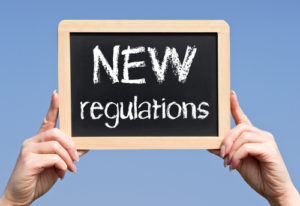CFTC Proposes Significant Changes to Its Whistleblower Program
 By Jason Enzler
By Jason Enzler
Last week the U.S. Commodity Futures Trading Commission (CFTC) proposed extensive amendments to the regulations implementing its five-year old whistleblower program. If adopted, the changes would expand and clarify its whistleblower protections, the scope of who can enforce whistleblower protections, the bases for how awards to whistleblowers will be calculated, and the process by which whistleblower claims will be evaluated, among other proposals.
Regarding protections against whistleblower retaliation, the proposed rules would align the CFTC whistleblower program with that of the Securities and Exchange Commission (SEC). For example, in several recent cases the SEC has prosecuted corporations for requiring employees to agree to release rights to bringing whistleblower claims or rights to rewards for tipping off the SEC to violations. The proposed amendments would prohibit entities regulated by the CFTC from requiring such releases. Also in light with the SEC, the CFTC’s new regulations would clarify that whistleblowers may seek recourse under the anti-retaliation provisions even if they do not qualify for rewards or if they report internally to their employers before reporting to the CFTC.
The proposed amendments would also empower the CFTC to prosecute cases involving violators of the anti-retaliation whistleblower provisions. Under current regulations, only whistleblowers may bring cases alleging retaliation under the CFTC’s whistleblower program. The proposed amendments would allow the CFTC to enforce its anti-retaliation protections, as the SEC is currently authorized to do, without the need for a private plaintiff.
Another notable change would amend the regulations to clarify that a whistleblower who submits information that leads to monetary recoveries by both the CFTC and another government agency may receive an award based on the CFTC’s action, the related government agency’s action, or both. One exception to this is that a whistleblower would not be eligible to receive a reward based on recoveries by both the CFTC and the SEC.
Administratively, the CFTC is scrapping its Whistleblower Award Determination Panel and replacing it with a Claims Review Staff. This is more than a bureaucratic swapping of names and represents a substantial shift of authority to the CFTC’s Enforcement Division. Currently, the process for determining whether a whistleblower will receive an award, and if so, its amount, is conducted by a Panel consisting of three members from separate offices or divisions of the CFTC. Personnel from the Enforcement Division are explicitly precluded from serving on the Panel. The proposed revision reverses this and authorizes the Enforcement Division head to select the Claims Review Staff, which may be comprised of Enforcement personnel so long as at least one person is from outside the division (and no one on the Claims Review Staff may have been involved with the underlying case).
This shift in authority to the Enforcement Division is part of a larger proposal to delegate to that division the overall administration of the CFTC’s whistleblower program. This not only reflects the same structure of the SEC’s program, but it also would appear to make the most sense. After all, the CFTC staffers charged with investigating and prosecuting fraud are likely to be in the best position to understand the contributions of whistleblowers to their efforts.
Several other important changes are contemplated as well. For example, the CFTC proposes to establish a process by which a whistleblower may contest an award denial or determination. Under the proposed regulations, the CFTC would have the authority to waive procedural rules upon a showing of extraordinary circumstances. Other changes involve regulations governing what constitutes whistleblower information for which the CFTC will provide rewards and time limitations for filing complaints with the CFTC in certain instances where a whistleblower has first reported the fraud elsewhere.
The CFTC is accepting comments on its proposed rules until September 29, 2016. Comments may be submitted directly to the CFTC here. To learn more, click here to view the proposed regulations or contact one of our experienced whistleblower attorneys.
Tagged in: CFTC Whistleblower Reward Program,